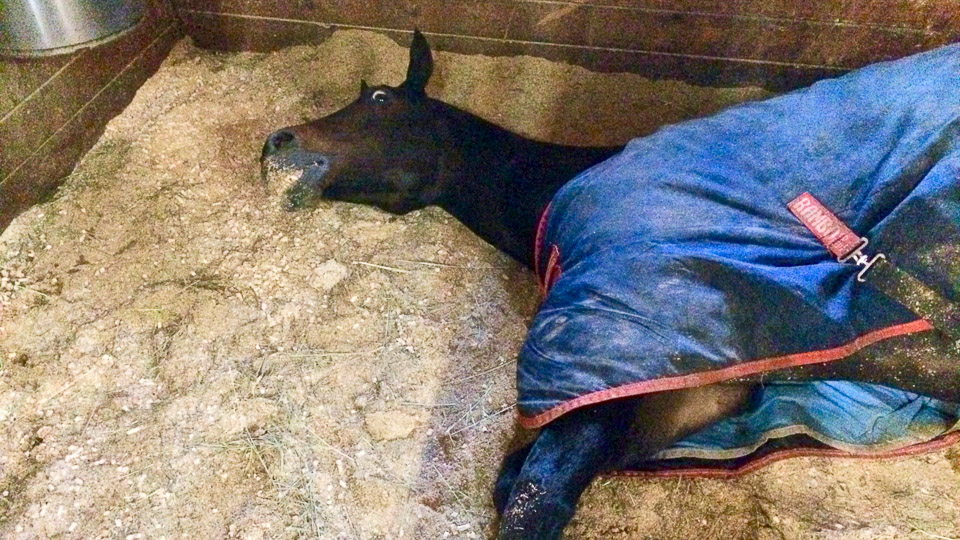
Horse Digestive System – An Introduction
The digestive tract starts at the mouth and ends at the anus. It is a tube that runs through the body and the contents within this tube are really outside the body – like the hole in the doughnut.
The lining of the digestive tract keeps out the things that are harmful and even deadly to the horse while allowing in the materials it needs to fuel the cells and maintain the various parts of the body. Selective absorption is the difference between the lining of the gut and the skin which otherwise is the same.
The tube is filled with a combination of acid, enzymes and bacteria and all of these are essential for the digestion of food and the survival of the horse. Attached is the liver that is critical to so many functions of the horse and really deserve a separate chapter but it is primarily a part of the digestive tract. It produces bile for the digestion of fats but because a horse doesn’t consume fat as part of the diet there is no need to make a lot and store it in a gall bladder. In addition, horses eat not in meals but in a steady intake for a major portion of the day. Therefore all horses are born without a gall bladder.
The tract is a one way street with all food pushed in one direction using muscular contractions (peristalsis) moving from the throat (esophagus) to the anus. Each section is divided into sections with specific purposes with specific acids, enzymes and gut bacteria. If any of these materials are moved to a different location (change in pH, dysbiosis), produced in excess (increased acid production) or are restricted (lack of an enzyme) then the digestive process is compromised. Further, if the tube integrity becomes compromised, the unwanted contents will start to move across this membrane into the body (leaky gut syndrome).
Inflammation of the lining of the gut is a major concern with horses today. Many human researchers suggest that up to 90% of our immune system is located in the gut making the rest of the body weak against attacks from other invaders (viruses, bacteria). This high activity is because there is a lot of inflammation of the gut system as it receives raw materials it was not developed to handle. The result is a change in the normal materials in the gut especially the resident bacteria. This is called dysbiosis and this leads to the epidemic amount of horses with ulcers of the stomach, the small intestines and the colon.
To discuss the GI tract without discussing nutrition is pointless so there will be a lot of overlap here and in the nutrition section under the CARE of the horse. The most serious issue in the digestive tract is colic. This is a word that strikes fear in horse owners with so many having lost at least 1 horse to this disease. However I see many equally disturbing problems with the digestive tract including diarrhea or squirts, stomach and colon ulcers, misbehavior and many metabolic issues. I will look at as many GI tract issues as I can think of but you may hear a common cause – stop feeding things to the horse they were never supposed to eat: grain, grain byproducts, pointless minerals, vitamins and supplements. At best you are wasting money getting an uncooperative horse. At worst you are causing them to become ill and even die.
Horse Digestive System – Choke
[x_alert type=“info” close=”false” heading=”Overview”]Choke in horses refers to when feed blocks the lumen of the esophagus and obstructs the passage of more feed down the esophagus into the stomach.[/x_alert]
Horse Digestive System – Colic
Colic describes pain in the horse coming from his gastrointestinal tract and is feared by every horse owner.
Horse Digestive System – Colic In The Horse – a HorseTalk™ Webcast
This is a replay of a HorseTalk™ webcast. Be sure to enroll in the next one and join Doc T live.
Horse Digestive System – Diarrhea
Diarrhea is when the transportation of ingesta moves through the digestive tract faster than normal taking with it more water than is normal.
Horse Digestive System – Leaky Gut Syndrome
Leaky Gut Syndrome In Horses
Horse Digestive System – Ulcers
Ulcers In Horses
Horse Immune Diseases – Insect Sensitivity
Insect sensitivity can range in degrees between different horses from mild to severe but is always during fly season.
Doughnut Hole
Our horses digestive tract is a tube running through the body. This is a fundamental principle to understand. The hole in the doughnut isn’t part of the doughnut but is necessary to the doughnut.
Symbiosis And The Horse’s Gut
Symbiosis is any type of a close and long-term biological interaction between two different biological organisms. Horses cannot live without the microbes living happily in their digestive tract.
Lectins
Lectins are plant proteins developed by plants to protect their seeds from being eaten and killed by animal digestion. They cause autoimmune disease, leaky gut syndrome and hormonal disruption, etc.
Constantly At War
In every moment of life in our horses, there is a battle between the body and the invading organisms surrounding them. To win, the immune system needs to be calm and in good condition.
Gut Microbes – Decomplexicating Equine Nutrition Part 3 of 12
You are not feeding the horse but you are feeding the trillions of microbes within their gut and they, in turn, feed the cells of the horse. Happy gut microbes = healthy horse.
Gut Inflammation – Decomplexicating Equine Nutrition Part 4 of 12
The digestive tract of the horse has a 1 cell thick lining with an army of defense cells behind it. Attacks on this cause the immune system to respond.
Foal Diseases – Diarrhea
An excerpt is coming soon.
Podcast #021 – The EquiSummit Conference On The Healthy Horse Gut
The EquiSummit Conference On The Healthy Horse Gut– The Horse’s Advocate Podcast #021
Podcast #022 – Parasites Revisited and Liver Disease
Meetings – Parasites Revisited and Liver Disease – The Horse’s Advocate Podcast #022
Podcast #033 – Understanding The Basics Of Colic In Horses
Understanding The Basics Of Colic – The Horse’s Advocate Podcast #032
Podcast #039 – Sand Colic In Horses
Three Dimension Communication With Horses (Part 2) – The Horse’s Advocate Podcast #035


Responses